#yule sabbat
Explore tagged Tumblr posts
Text


Used my dried oranges and cinnamon sticks to make a Yule craft 🍊❤️
These will be hanging in my window to celebrate the return of light as we move away from the darkest day of the year. Such a perfect little low-cost & low-waste option. Especially if you live somewhere that your citrus trees are still producing fruit (like me).
14 notes
·
View notes
Text
Happy Yule, twinks!!!!










#yule#yule aesthetic#yuletide#happy yule#winter#winter solstice#happy solstice#solstice#wheel of the year#sabbat#sabbats#yule sabbat#witchcraft#witchy#magic#witch#gay witchcraft#gay witches#gay witch#queer wicca#gay wiccans#gay wicca#gay magic#wiccan twinks#gay#twinks#gay twink#twink#my thoughts#about this blog
7 notes
·
View notes
Text
Yule / Winter Solstice Altar 🕯️
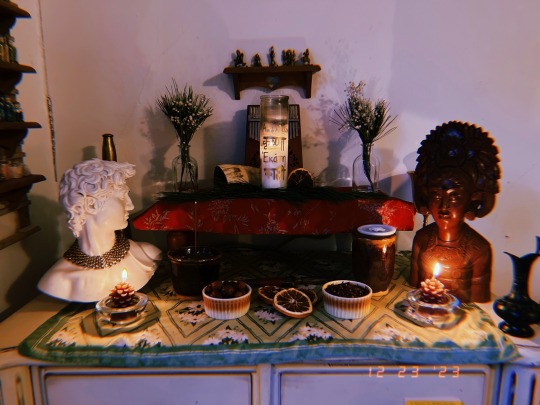
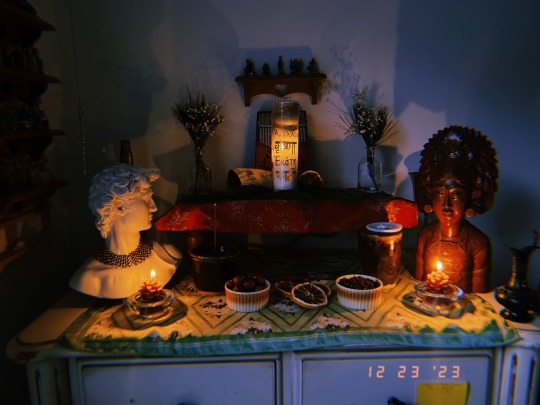
#thewitchfarhan#the witch Farhan#image post#Yule#Winter Solstice#Sabbat#Yule Sabbat#pagan#witch#witchblr#witch altar#witches altar#altar#altar aesthetic
24 notes
·
View notes
Text
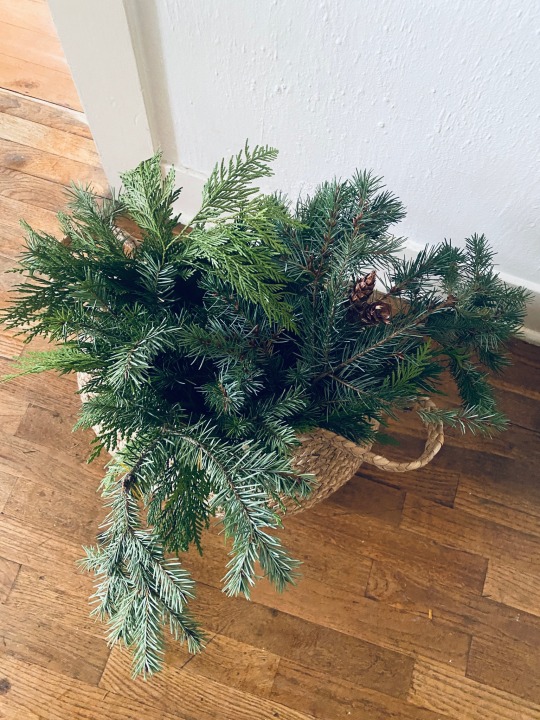
finished project post, all the branches are clean, dry, and displayed beautifully 🌲🎀
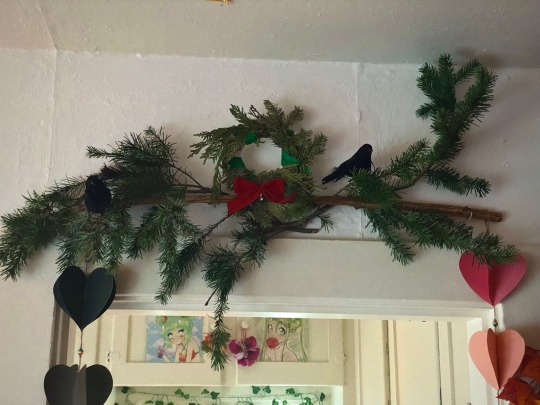
i think i’ll do another nature walk soon, as i have an idea for a branch with red ornaments and there are a few more spaces i could liven up 😉🌲
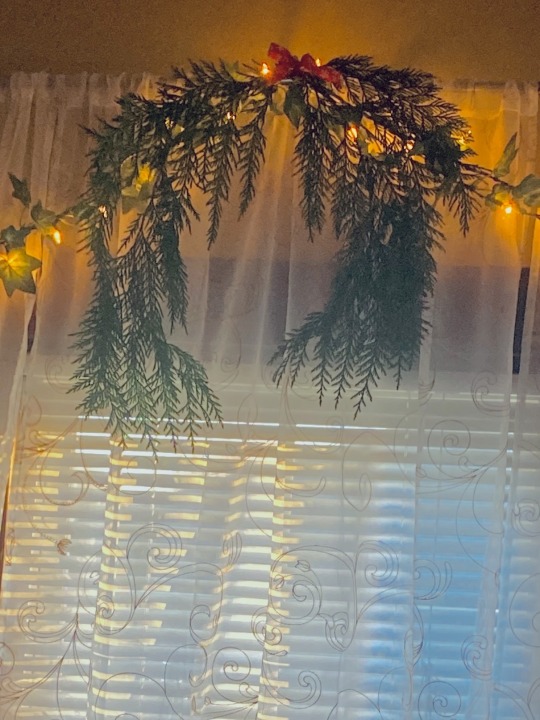
the bough i’m most proud of tho is the crow branches. it makes me feel like i’m actually in the forest ngl. how are you decorating with nature this year?? comment below to spread inspiration!

#christmas#diy#diy craft#holiday#magic#magicol by design#pagan#the holidays#winter#winter solstice#nature#trees#tree branch diy#natural holidays#cypress#fir#pinecones#yule#sabbat#yule sabbat#altar#winter altar#yule altar#ancestor shrine#love#dishes#natural christmas#natural yule#celebration#decoration
3 notes
·
View notes
Photo
Blessed Yule, my lovelies. 🌞🕯️🌲❤️
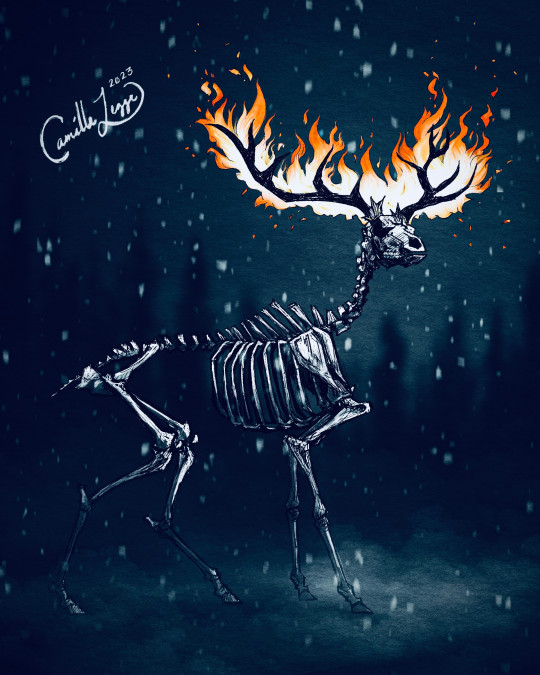
Rudolph Shines Bright by Camille Legge
2K notes
·
View notes
Text









Who's excited for Yule?
#whimsigothic#whimsigoth#whimsical#whimsigoth room#whimsigothcore#whimsigothaesthetic#witchy aesthetic#witches#witchy#witchyvibes#witch#witchcraft#witchythings#witchcore#witch aesthetic#witch blog#whimsical aesthetic#aesthetic#whimsigoth style#witchy vibes#yule#yuletide#winter solstice#xmas#christmas#yule log#yule aesthetic#yule altar#wheel of the year#sabbats
8K notes
·
View notes
Text
THE SABBATS








#fyp#fypシ#fypシ゚viral#fypage#fyppage#tumblr fyp#witchcraft#witches#witch#witchcore#witch community#witchy things#sabbats#imbolc#ostara#beltane#litha#lammas#mabon#samhain#yule#wheel of the year#information#helpful#occult#satanist
5K notes
·
View notes
Text
#celebrate yule#yuletide#embrace the light#wicca#witchcraft#pagan yule#witches yule#witches sabbat#sabbat#yule sabbat
1 note
·
View note
Text

@paperwitchco
#litha#ostara#beltane#yule#imbolc#manbon#lammas#lughnassadh#autumn equinox#spring eqinox#summer solstice#winter solstice#sabbat#wiccan sabbat#witches sabbat#wheel of the year#cakes and ale#witchblr#witches of tumblr#witchcraft#wicca#pagan#witchy#witchy things#baby witch#kitchen witch#kitchen witchcraft#hearth witch#hearth witchcraft
359 notes
·
View notes
Text









Yule > Christmas
🌲🕯️👻🧣🪵🕊️🥧❄️⛄️🌲
#traditional witch#yule#yuletide#witchcraft#hearth witch#pagan witch#witchy things#cottage witch#house witch#hearthcraft#paganism#witch#winter#winter solstice#pagan sabbats#dark christmas
58 notes
·
View notes
Text
Updated version:
December 2023 witch guide
Full moon: December 26th
New moon: December 12th
Sabbats: Yule December 21st-January 1st
December Cold Moon
Known as: Drift Clearing Moon, Frost Exploding Tree Moon, Moon of the Popping Trees, Hoar Frost Moon, Snow Moon, Winter, Aerra Geola, Maker Moon, Heilagmanoth, Long Night's Moon, Oak Moon, Wintermonat, Moon of the Long Night, Little Spirit Moon, Wolf Moon & When the Deer Shed Their Antlers Moon
Element: Fire
Zodiac: Sagittarius & Capricorn
Nature spirits: Snow, Storm, & Winter Tree faeries
Deities: Athena, Fates, Hades, Hathor, Hecate, Ixchel, Minerva, Neith, Norns, Osiris & Persephone
Animals: Bear, deer, horse & mouse
Birds: Robin, rook & snowy owl
Trees: Fir, Holly & Pine
Herbs: Bay, cedar, chamomile, cinnamon, English ivy, evergreen, fir, frankincense, holly, mistletoe, myrrh, pine & sage
Flowers: Christmas catus, holly & poinsettia
Scents: Cedar, cinnamon, frankincense, ginger, lilac, myrrh, nutmeg, patchouli, pine, rose geranium, rosemary, saffron, violet & wintergreen
Stones: Bloodstone, blue topaz, cat's eye, garnet, jacinth, obsidian, peridot, turquoise, zircon, ruby & serpentine
Colors: Black, blood red, gold, green, red, silver, black & white
Energy: Alchemy, darkness, endurance, death & re-birth, higher education, publications, reaching out to others, religion, spiritual paths, travel & truth
Today, December’s full Moon is most commonly known as the Cold Moon—a Mohawk name that conveys the frigid conditions of this time of year, when cold weather truly begins to grip us.
This full Moon has also been called the Long Night Moon (Mohican), as it rises during the “longest” nights of the year, near the December winter solstice. This name is doubly fitting because December’s full Moon shines above the horizon for a more extended period than most full Moons.
In Europe, ancient pagans called the December full Moon the “Moon Before Yule,” in honor of the Yuletide festival celebrating the return of the sun heralded by winter solstice.
Yule
Also known as: Alban, Arthan & Winter Solstice
Season: Winter
Symbols: Baskets of clove studded fruit, Christmas catus, decorated evergreen trees, evergreen boughs, gifts, gold pillar candles, hung mistletoe, poinsettias, wreaths & Yule logs/small Yule log with three candles
Colors: Gold, green, orange, red, silver, white &yellow
Oils/incense: Bayberry, cedar, cinnamon, frankincense. Myrrh & pine
Animals: Bear, boar, deer (stag), pig, squirrel & tiger
Birds: Eagle, goose, kingfisher, lapwing, owl robin & wren
Stones: Bloodstone, garnet, ruby, alexandrite, blue topaz, cat's eye, citrine, clear quartz, diamond, emerald, green tourmaline, jet, kunzite & pearl
Foods: Caraway cakes, cookies, eggnog, fruits, ginger tea, nuts, pork, spiced cider, turkey, wassail & lamb's wool (ale, sugar, nutmeg & roasted apples)
Herbs/plants: Bay, bayberry, birch, blessed thistle, cedar, chestnut, cinnamon, evergreens, fir, frankincense, ginger, holly, ivy, juniper, mistletoe, moss, myrrh, oak, pine, rosemary, sage, valerian & yellow cedar
Flowers: Chamomile, poinsettia & yarrow
Goddesses: Alcyone, Aphrodite, Ameratasu, Bona Dea, Brighid, Cailleach Bheur, Demeter, Diana, Fortuna, Frau Holle, Frau Perchta, Frigga, Gaia, Hel, Great Mother, Idunn, Isis, Ishtar, Kolyada, La Befana, Maat & Tiamat
Gods: Apollo, Attis, Balder, Bragi, Dionysus, Divine Child, Green Man, Helios, Holly King, Horned one, Horus, Janus, Lord of Misrule, Lugh, Mabon, Marduk, Mithras, Odin, Ra, Saturn & Surya
Issues Intentions & Powers: Darkness, divination, light, messages/omens, purification, rebirth/renewal & transformation
Spellwork: Earth magick, happiness, harmony, love & peace
Activities:
• Set up & decorate a Yule altar
• Clean, organize & cleanse before decorating your home
• Make witch's balls to hang on your tree (protective & pretty!)
• Decorate & bless & Yule tree
• Stay awake until dawn to observe the cycles of nature
• Give gifts tomyour family & friends
• Donate your time or helpful items to charity
• Go caroling
• Hang mistletoe in your doorways
• Make Wassail
• Prepare a Yule Log
• Host a Yule feast
• Craft your own decorative wreath
• Decorate your house with Yule colored candles
• Welcome the Sun
• Go on nature walks & leave offerings to nature
• Meditate & reflect on the passing year
“Yule” comes from Old English geol, which shares a history with the equivalent word from Old Norse, jól. Both these words referred to a midwinter festival centered around the winter solstice, which traditionally marked the halfway point of the winter season. After the solstice—the shortest day of the year—the days again begin to grow longer, so it’s thought that Yule was a celebration of the re-appearance of the Sun &the fertile land’s rebirth.
The celebration of Yule is one of the oldest winter celebrations in the world. Ancient people were hunters & spent most of their time outdoors. The seasons & weather played a significant part in their lives. The customs and traditions associated with it vary widely.
Scholars have connected the original celebrations of Yule to the Wild Hunt, the god Odin, and the heathen Anglo-Saxon Mōdraniht ("Mothers' Night")
Some believe it marks the rebirth of the Sun (the God) from the Earth (the Goddess) & the cold days of winter will soon begin to wane. The Goddess is seen in her virgin Maiden aspect
In towns and cities throughout Sweden during the Christmas season, large goats are constructed out of straw. It is thought that the tradition originated in ancient times, perhaps as a tribute to the god Thor, who was said to ride in a chariot pulled by goats. In Sweden the goat came to be associated with the Christmas celebration, and the Yule goat is now considered by many to be a companion or counterpart to Santa Claus.
Related festivals:
Christmas- An annual festival commemorating the birth of Jesus Christ as the son of God, primarily observed on December 25th
Hanukkah- A Jewish festival commemorating the recovery of Jerusalem & subsequent rededication of the Second Temple at the beginning of the Maccabean Revolt against the Seleucid Empire in the 2nd century BCE.
Hanukkah is observed for eight nights & days, starting on the 25th day of Kislev according to the Hebrew calendar, which may occur at any time from late November to late December in the Gregorian calendar. The festival is observed by lighting the candles of a candelabrum with nine branches, commonly called a menorah or hanukkiah.
Kwanzaa- An annual celebration of African-American culture from December 26 to January 1st, culminating in a communal feast called Karamu, usually on the sixth day. It was created by activist Maulana Karenga, based on African harvest festival traditions from various parts of West & Southeast Africa. Kwanzaa was first celebrated in 1966.
A Kwanzaa ceremony may include drumming and musical selections, libations, a reading of the African Pledge & the Principles of Blackness, reflection on the Pan-African colors, a discussion of the African principle of the day or a chapter in African history, a candle-lighting ritual, artistic performance & finally, a feast of faith (Karamu Ya Imani).
Saturnalia-
is an ancient Roman festival and holiday in honour of the god Saturn, held on 17 December of the Julian calendar & later expanded with festivities through to 23 December. The holiday was celebrated with a sacrifice at the Temple of Saturn, in the Roman Forum & a public banquet, followed by private gift-giving, continual partying & a carnival atmosphere that overturned Roman social norms: gambling was permitted & masters provided table service for their slaves as it was seen as a time of liberty for both slaves and freedmen alike.
A common custom was the election of a "King of the Saturnalia", who gave orders to people, which were followed & presided over the merrymaking. The gifts exchanged were usually gag gifts or small figurines made of wax or pottery known as sigillaria. The poet Catullus called it "the best of days".
Other celebrations:
Feast of Epona-
Eponalia is the feast day of Gaulish Goddess Epona, the Divine Mare & in the time of the Roman Empire it was celebrated on December 18th.
Epona is known to be one of a very few Gaulish deities whose names were spread to the rest of the Roman Empire. This seems to have happened because Roman cavalry units stationed in Gaul followed Her & adopted her as their Patroness. This may have started because many of the cavalry troops were conscripted from Gaul as they were superb horsemen. From Gaul the Romans took Epona with them including to Rome where She was given her own feast day on the 18 December. They worshipped her as Epona Augusta or Epona Regina & invoked her on behalf of the Emperor. She even had a shrine in the barracks of the Imperial Bodyguard.
Hunting of the Wren-
A traditional custom carried out on the Isle of Man on the 26 December, St. Stephen's Day. It consists of groups of people going around villages and towns singing and dancing a traditional song and dance around a decorated wren pole.
The earliest and most common folklore story accounting for the origin of hunt the wren tells of a fairy/enchantress/witch whose beauty lures the men of the Isle of Man to harm, for which she is chased and is changed into the form of a wren. It is therefore in punishment for her actions that the wren is hunted on St. Stephen's Day
Sources:
Farmersalmanac.com
Llewellyn's Complete Book of Correspondences by Sandra Kines
A Witch's Book of Correspondences by Viktorija Briggs
Llewellyn's 2023 magical almanac: practical magic for everyday living
Wikipedia
Encyclopedia Britannica
#correspondence#cold moon#witch guide#december 2023#winter solstice#yule#witchblr#witch community#wiccablr#paganblr#witch tumblr#witchcraft#witch tips#beginner witch#baby witch#witch stuff#spellbook#grimoire#book of shadows#spellwork#sabbat#wheel of the year#traditional witchcraft#witchyvibes#witches of tumblr#witches#witchcore#GreenWitchcrafts#witchy things
319 notes
·
View notes
Text

I’m prepping for Yule tomorrow ❄️ As we face the darkest day of the year, remember that there is always light coming 🧡☀️
I’m making an orange, rosemary, and cinnamon simmer pot! Orange for positivity, rosemary for protection, and cinnamon for abundance. 🍊💚
I’m also going to be drying out the orange slices to create a Yule craft to bring positivity and optimism into my life and home for the upcoming light.
7 notes
·
View notes
Text
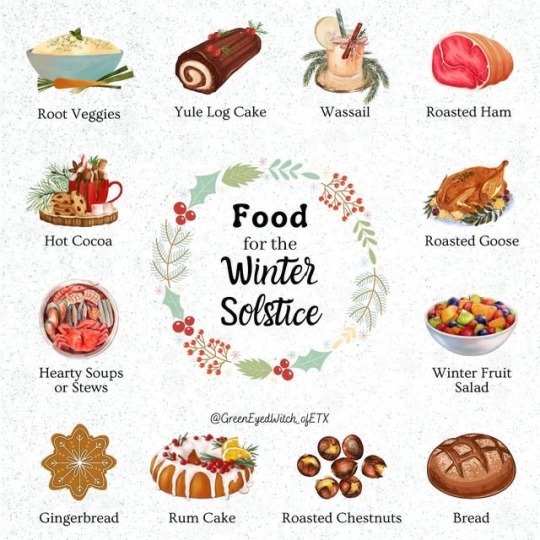
#Yule#yuletide#pagan#spiritual healing#spirituality#healing#nature#paganism#earth#altars#sabbats#spiritual community#spiritual practitioner#holistic practitioner#black witches#pagans of color#paganlife#pagan life#pagan blog#yule log#photos#food#meals#holidays#winter
274 notes
·
View notes
Text

Blessed Yule/Winter Solstice ❄️
#yule#yuletide#solstice#winter solstice#winter#pagan#moodboard#witchy moodboard#sabbat#wheel of the year#witch#witchblr#witch aesthetic#witchcraft#wicca#wiccan#witches of tumblr#witchesoftumblr#witchesofinstagram
50 notes
·
View notes
Text
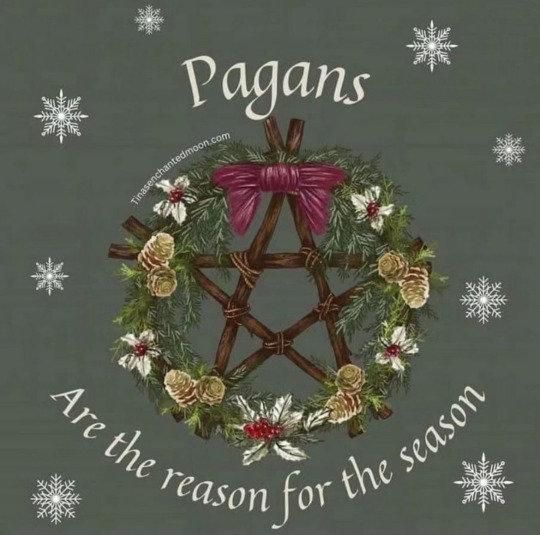
190 notes
·
View notes
Text

Altar alight for the longest night. Happy Solstice and Blessed Yule!
24 notes
·
View notes